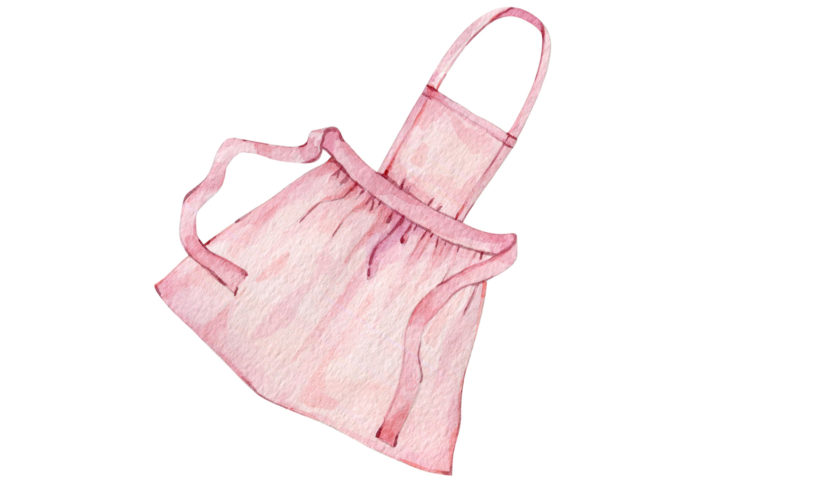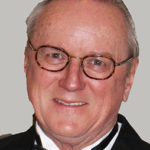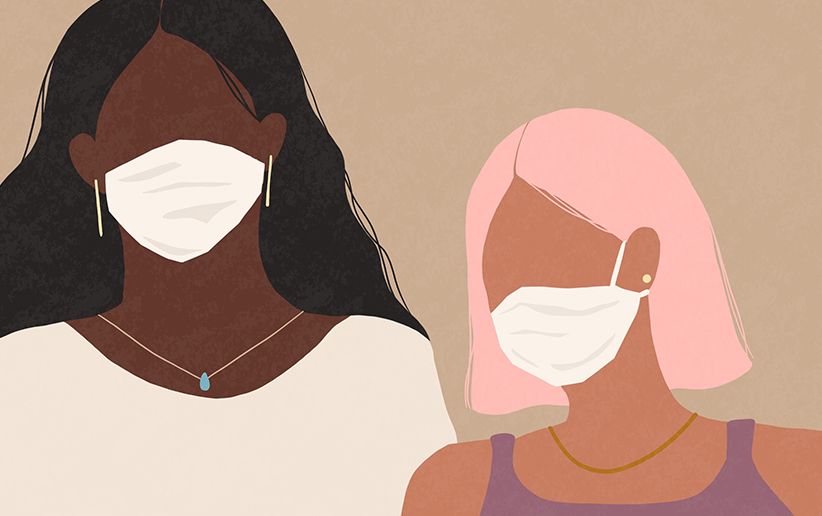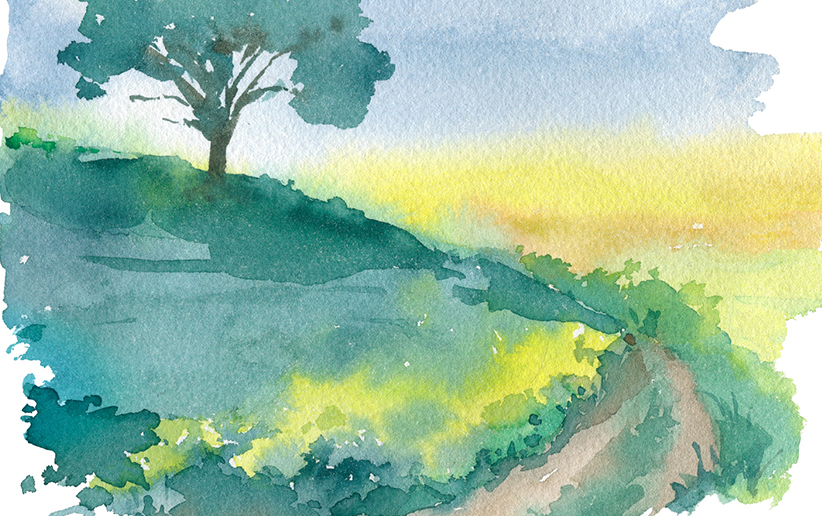“Can you just slow down? Can you drive slower?” cousin Mary requested as she sat beside me.
“I can,” I assured her as I dropped my speed. “But we’re on the highway and I have to keep up.”
It was 1964 and at that time I had no idea what post-traumatic stress could be, notwithstanding the fact that Mary was in and out of symptoms. Freeway speeds and moving vehicles connected deeply with her past and were the source of major anxiety.
In 1933, she was one of the primary initiators of the Underground in her home village of Gorlice, Poland. When the Nazi’s came for her, they dragged her down the street by her hair. As an elementary school teacher, her additional crime was going to the homes of Jewish children to keep them current with their lessons.
In the Bergen-Belsen concentration camp, she lived in the ranks of political prisoners and was sterilized without anesthesia, abused, and used as a slave. One of her imprisonments was at Ravensbruck, a concentration camp for women. Barely past girlhood herself, and living in her own trauma, she worked to protect the young girls from harm, such as beatings and rape. She taught them how to hide and become invisible. Girls started referring to her as Matka, meaning “mother” in Polish. Liberated from the horror by British soldiers, this freedom fighter, my mother’s first cousin, was now sitting beside me as we rode down the highway. On a shared sacred journey, we were traveling towards the Greater Pittsburgh Airport.
The current mission was about another flight from oppression, as we were off to welcome Mary’s sister, who would be arriving from Warsaw. Cousin Stepha was a nursing instructor, and in recent times had been through the Soviet version of imprisonment.
Stepha and her fiancé made the mutual decision that they would not marry in a country that was behind the Iron Curtain. When they tried to escape by breaching the border, her supposed husband-to-be succeeded, and she was apprehended. Once released from a Soviet labor camp, my family was able to acquire a six-month visa on her behalf for medical reasons. I’m uncertain as to how long it had been since these two sisters had seen each other.
Wearing a thread-bare jacket, Stepha disembarked from the plane. There was a visible warmth between the two women accompanied by a noticeable stiffness in their greeting. It’s as though they were in shock. It was evident that they didn’t know quite what to do or say. There was difficulty finding words.
During World War II, messages from the Underground would relate days and times for the transport of prisoners. Stepha and her family would buy tickets to the train hoping to make eye contact with her older sister, Mary. It was too dangerous for them to speak to her.
And Stepha was no stranger to the train. At the age of 14, it was her mode of travel for transporting goats. Boldly arguing with Nazi guards, she would tell them that she must travel with the goat because her “friend (to whom she traveled) was sick” and could only drink goat’s milk. But the “friend” she spoke of was the Warsaw Ghetto, and the goat would serve as food amidst intentional attempted starvation.
It wasn’t so much about what these two women would say to each other at this reunion, but more about where to start. As we waited for luggage, it was understood by Stepha that I am the child of her cousin, Maryann. She hugged me and proclaimed in Polish, “I am in the free land!”
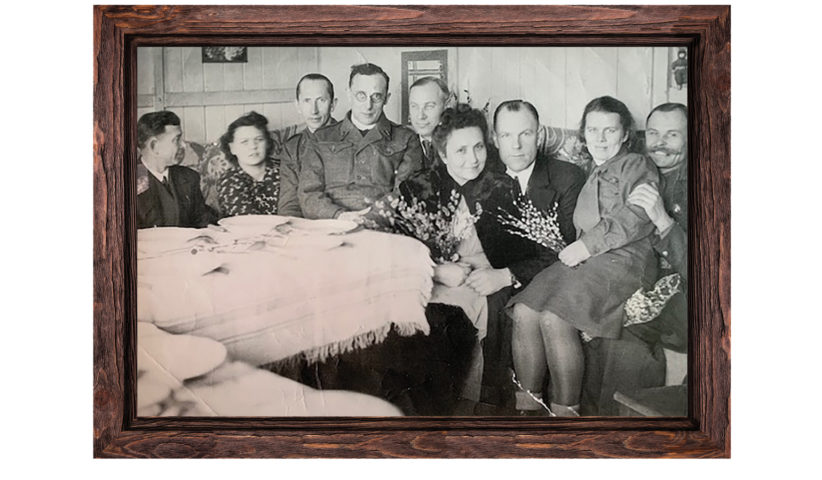
Cousin Mary Symerski’s wedding in a displaced persons camp in Germany, May 1945. As the fourth person from the right, she carries a bridal bouquet of pussywillows, the only flowers available at the camp. Her wedding dress is fashioned from potato sacks that were dyed black for the occasion.
With all of these stories of frightening events permeating my family, I now know that when I consider transgenerational trauma, both primary and secondary, my family has lived with both. The stories about the goats, the train and the Nazi confrontations were unknown until the year 2015. Even then, I watched a wave of emotions reverberate through my family. There were feelings of sorrow, sadness for the victims, and anger at the perpetrators.
On the way to Mary’s home, Stepha was wide-eyed and emotional as we walked through a supermarket. “Is this real?” she questioned. “Is all this food real? We (in Poland) have to stand in line for food and accept whatever they will give us!” She was reflecting on the ravages of the communist occupation of her country and the resulting continued poverty and scarcity of food in the post-war occupation. She was amazed at the unbridled abundance.
I didn’t fully understand it at the time, but as years passed, I came to know that transporting these dynamic survivors who once experienced different versions of hell on Earth, would be one of the most meaningful events of my life. Their perseverance and survivorship inspired me because even then, I knew that not everyone in America lived with a real sense of freedom. Mary would always tell me, “America is not perfect, but it’s the best place I know.”
In my over-indulged post-childhood life, I uttered succinct expressions regarding my demands of the world (I’d like a sports car, please). She would always remind me, “Cultivate you mind and your heart. You will always own what’s in them and no one can ever take those things away.” She was reflecting what Dr. Victor Frankl (1946) proclaimed to the world as a survivor of Auschwitz in his book, Man’s Search for Meaning. Had she met him? Although unconfirmed, I’m certain of it. At one point, as a political prisoner, Frankl was assigned to work with typhus patients, and she was forced, in an experimental context, to be one of them. She often spoke of “the kindly doctor.”
And me? At this time in my life, I was learning to accept that I am part of the LGBT subculture. I was aware that there were dramatic negative consequences for being who I was in America. Stories of police with night sticks raiding gay bars and throwing people in jail were common. The Stonewall Rebellion against such actions wouldn’t happen for another five years. My cousins lived in the memory of their oppression, but my subculture and I were living in the reality of ours. The American Psychiatric Association listed our sexual orientation as a mental disorder!
When Mary was part of the Underground, she helped provide safe passage for those who were running for their lives, including those who were Jewish, LGBT, and members of the Roma Tribe. Would I need an Underground, as well? Would I need a waystation of my own to transport me from homophobic violence to safety? But I had these two oppression fighters in my naïve presence. They were shining examples of the fact that people can choose to fight the worst monsters imaginable and survive. Their example lit the fires of advocacy and rebellion that lived in my own heart and nested in my unconscious for safe keeping. I was soon to engage in an intense battle with homophobia, and later, another long skirmish on behalf of those with AIDS.
It was Thanksgiving time, and I can still smell the turkey in Mary’s kitchen, as we arrived at her home. It was such a festive and celebrative dinner, an occasion that neither sister believed would ever be a reality. Mary was always giving me her deep wisdom as I continued to attempt maturity, and I would have the honor of Stepha’s presence for the next six months. We would celebrate Christmas! The wisdom of their example stayed with me throughout my life, and it’s given me insights on behalf of the “abused” to whom I would offer healing as a therapist. In this profound moment, however, after a bite of turkey, I left them in their festive celebration to find their lost years and share in the light of survival and sisterhood.
Christmas came quickly. The holiday party and dinner at Cousin Mary’s was a spectacular celebration. As a transformed woman, Stepha greeted me warmly and I thought, “Who is this woman?” Her now healthful and fashionable appearance reflected her young 45 years. These moments of joy celebrated healing.
She initiated games around the Christmas tree. May it be known to the world: Laughter heals trauma! But before dinner, she grabbed my hand and took me over to the tree. With my father interpreting, she told me in Polish that we couldn’t have dinner until she was wearing her serving apron. She needed a handsome man to help her with that. “But there is one stipulation,” she informed me as she placed a cloth over my eyes and tied it behind my head. I obviously I had to tie a bow behind her apron with a blindfold over my eyes. After I sailed through the exercise with skilled precision, she hugged me and presented me with a candy decoration to place on the tree. Then, in her newly practiced English, she announced “DINNER IS READY!”
There were a few tears amidst the spread of a sumptuous Eastern European feast. My grandmother voiced her gratitude for everyone’s survival. Years before, in Turtle Creek, Pennsylvania, as an incredibly young child, I sat beside her as she engaged in her own rescue mission. I listened as she calculated time zones and conducted trans-oceanic phone calls to the International Red Cross. I was right there when she learned that her niece, Mary, now triumphantly sitting beside her, was alive and in a displaced persons camp in Ober Braunschweig, Germany. My grandparents would bring her and her new husband, to America.
There were a few tears amidst the spread of a sumptuous Eastern European feast.
It was unknown to me as to whether Stepha was able to connect with her former fiancé. Because she never married, it appears that like so many others that escaped oppression, he became an unfound soul that disappeared in the wind. Through fate, time, and loss, Stepha would soon be the matriarch of this loving Polish family that spanned two continents.
When she passed away at the age of 95 in the year 2015, my mother, at the age of 88, would take her place in that role until the year 2020 when she passed. Mother was the last living person in our family from the World War II generation. As she read Stepha’s writings and we discussed the “Train Stories,” she related that knowing what they went through “Made her heart cry!”
Prior to her death, there were two overriding thoughts about her former life that Mary made emphatically clear. First, she declared that “In spite of the consequences, if I had to do it all again, I would!” And second, “If there’s anything that provided me with strength to survive, it was my Christian Faith.”
Little did I know that because of the homophobia that lived in this culture, as well as the coming scourge of AIDS, I was about to see different oppressions with different victories. Through the example of these two heroic women, I too would be a warrior against oppression and act as a healer when possible. Human beings could be abused by the worst monsters imaginable, and not only find ways to recover, but to laugh and heal. It was yet to occur to me that I would help others do the same as a marriage and family therapist. Living in the family projection process of these intense emotions would leave me with the unexpected gift of a finely-tuned intuition. I would use it well. I had just begun living in an LGBT subculture with all its raw emotions, hopes, hurts and dreams. I hob knobbed with two powerhouse women who showed me what to do next. It was 1964 and I was 20 years old.
This article is offered free by AAMFT. If you are interested in accessing other content, join today!
